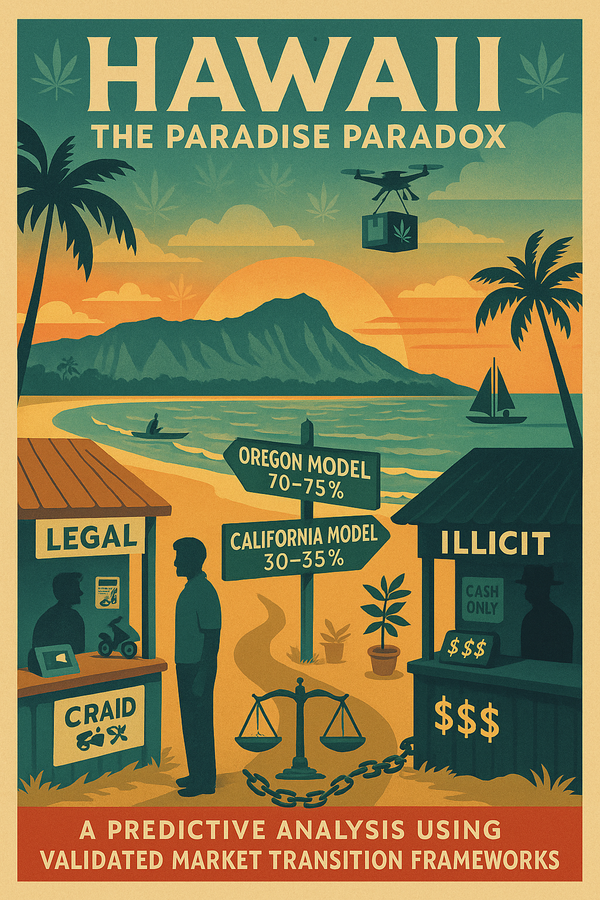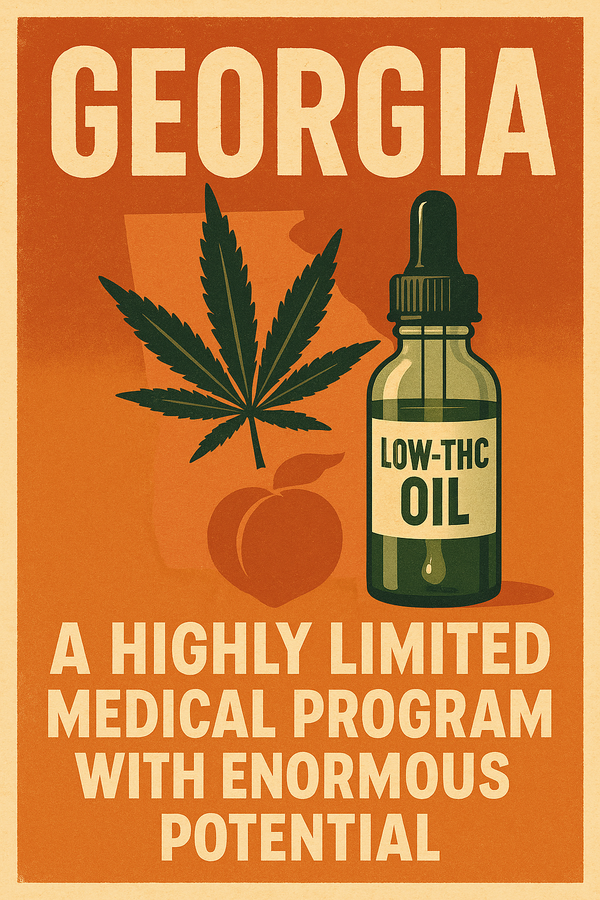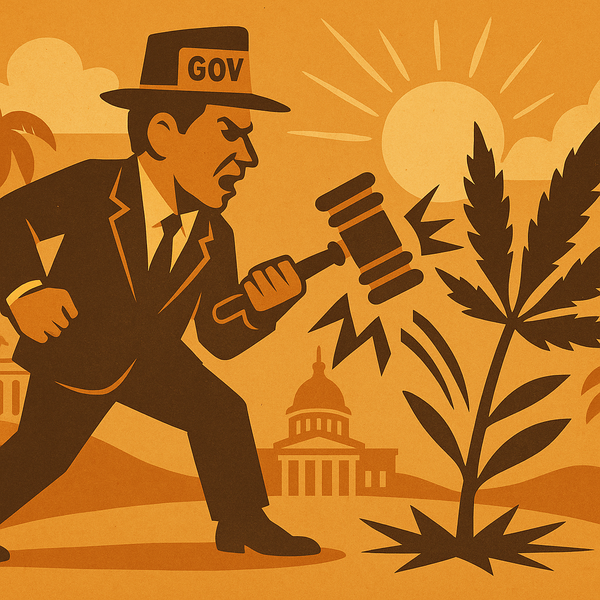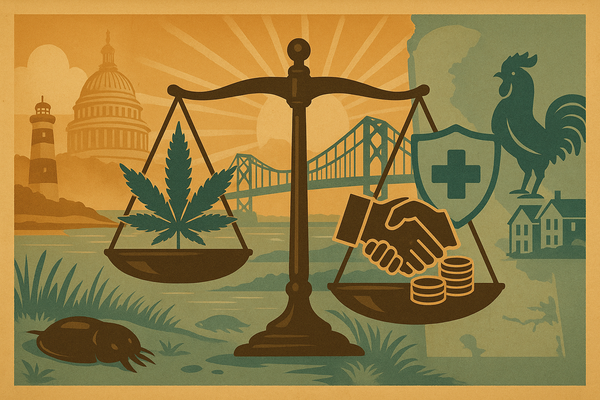Cannabis Is Coffee, Not Cocaine: The Health Reality Check — Part 1
Cannabis vs. coffee: Why the substance keeping me calm is demonized while the one making him shake is celebrated. Part 1 of the health reality check
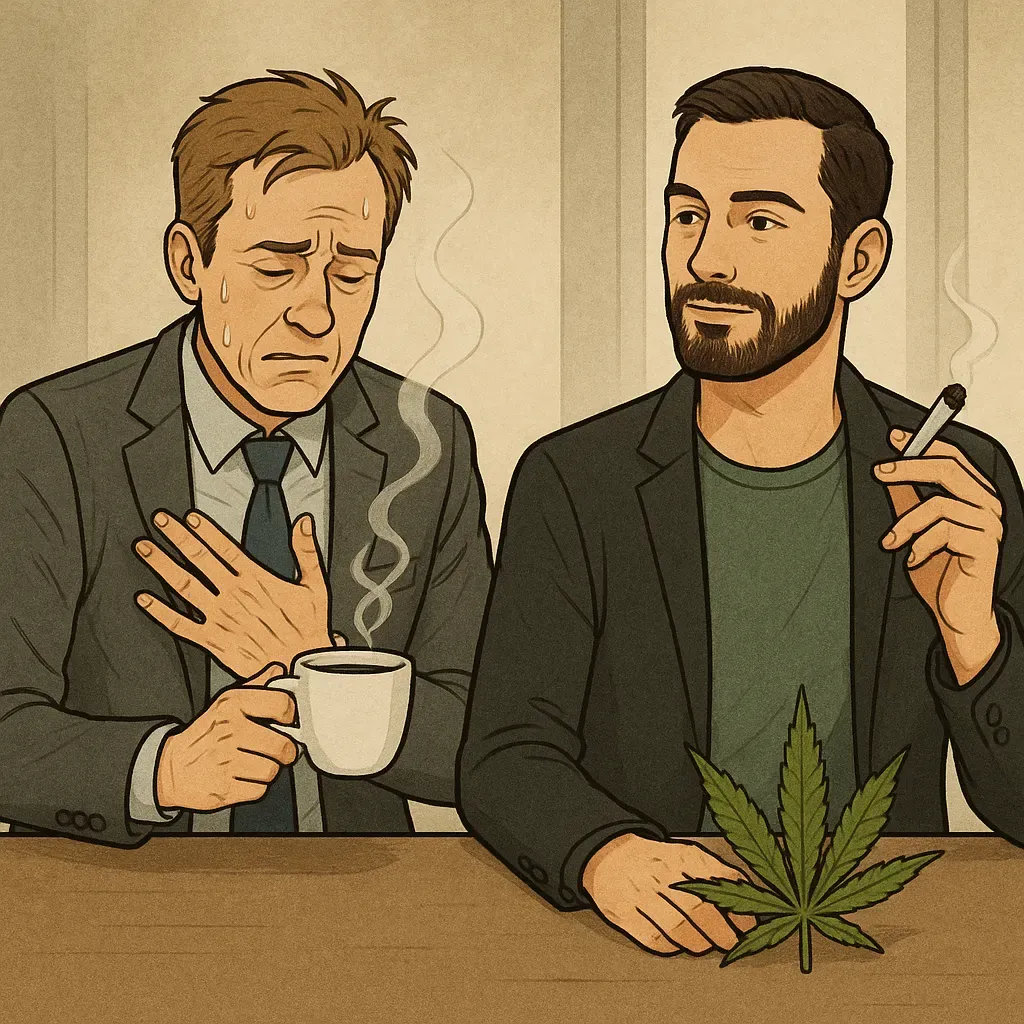
I’ll never forget the day a colleague questioned my judgment for using cannabis — while sipping his fourth espresso of the morning.
His hands were shaking. Mine were steady.
He was anxious about a deadline, complaining about not sleeping well, and rubbing his stomach from acid reflux. I was calm, focused, and ready to tackle the day’s work.
Yet somehow, I was the one with the “problem.”
He didn’t say it directly — he didn’t have to. It was in the raised eyebrow when I mentioned using cannabis the night before. The subtle judgment. The unspoken assumption that his daily caffeine dependency was “normal” while my occasional cannabis use was… questionable.
That moment crystallized something I’d observed for over 20 years: We’ve normalized one psychoactive substance while demonizing another, despite the science showing they’re remarkably similar — or that coffee might actually be riskier.
This isn’t just unfair. It’s costing us honest conversations about real health risks.
In a world where grabbing a latte is celebrated as a productivity hack while lighting up a joint conjures images of couch-locked slackers, it’s time to flip the script.
Coffee drinkers get a free pass as the epitome of hustle culture. Cannabis users? Lazy, unmotivated, perpetually baked — or so the stereotype goes.
But what if the science tells a completely different story?
By comparing these two psychoactive substances head-to-head on health risks, addiction potential, and real-world impacts, we can expose how deeply flawed these perceptions are.
Spoiler: Your daily brew might be doing more harm than good, and cannabis’s rap sheet is far cleaner than you’d think.
Let’s break it down with facts, not folklore.
The Stereotype Smackdown: Who’s Really the “Lazy” One?
The “lazy stoner” trope persists despite mounting evidence to the contrary. Recent surveys paint a radically different picture of cannabis users:
Cannabis users are fitness enthusiasts, not couch potatoes. A 2025 survey of over 600 cannabis consumers found users are nearly five times more likely to exercise regularly than to hit the drive-thru. Specifically, 27.4% work out daily and 34.9% multiple times a week, compared to just 1.5% eating fast food daily and 11.5% multiple times weekly.
These aren’t “potheads” zoning out — they’re wellness warriors integrating cannabis into active lifestyles, using the plant for workout recovery, pain relief, and focus during exercise.
The infamous “amotivational syndrome” — the idea that cannabis makes users lazy — has been systematically debunked by decades of research.
Meanwhile, coffee drinkers chase the “responsible adult” drug through endless refills to combat crashes, leading to anxiety-fueled “productivity” that’s anything but sustainable. The harried parent slamming espresso shots, masking exhaustion with artificial alertness? That’s not healthy — it’s dependence with a cultural halo.
As research shows, both substances alter brain chemistry, yet only one gets villainized.
The verdict: These stereotypes aren’t just unfair — they’re backwards. Cannabis users are statistically more active and health-conscious, while coffee’s “go-getter” vibe masks a cycle of dependence. Prohibition-fueled fear has warped our lens, making coffee untouchable and cannabis the scapegoat.
Head-to-Head Health Risks: Coffee’s Hidden Dangers vs. Cannabis’s Mellow Profile
Here’s the real comparison — side by side, backed by data:
ADDICTION POTENTIAL
Caffeine (Your Daily Cup): Highly addictive — 66% of Americans consume coffee daily. Tolerance builds via adenosine receptor changes. Withdrawal hits hard: headaches, nausea, fatigue, depression.
Cannabis (A Puff or Edible): Mild or no physical dependence; withdrawal is subtle (irritability, light insomnia). Less habit-forming overall.
Fair Comparison Verdict: Coffee wins the addiction Olympics. Both tweak mood, but caffeine’s grip is tighter and more disruptive to daily life.
OVERDOSE RISK
Caffeine: Lethal dose: 3,200–10,000mg (achievable with concentrated products). Caffeine-related hospitalizations occur regularly.
Cannabis: Zero confirmed overdose deaths ever. High doses cause discomfort (anxiety, nausea), but no lethal toxicity threshold.
Fair Comparison Verdict: Cannabis is untouchable here. Coffee’s “safe” image ignores real emergency room visits.
PHYSICAL HEALTH IMPACTS
Caffeine: Can cause: anxiety, insomnia, acid reflux, heart palpitations, tremors, digestive issues. Chronic overuse taxes cardiovascular system.
Cannabis: Lower overall toxicity. Smoking can irritate lungs, but even heavy cannabis smokers show no increased lung cancer risk, defying conventional wisdom. Vaporizing/edibles avoid respiratory concerns entirely. High doses may impair coordination but cause no organ damage.
Fair Comparison Verdict: On par at moderate use, but coffee edges out as more consistently taxing on heart and gut. Cannabis harms are dose-specific and avoidable.
MENTAL/BRAIN EFFECTS
Caffeine: Boosts alertness by blocking adenosine receptors, but suppresses endocannabinoid system (natural relaxation), leading to crashes and potential anxiety.
Cannabis: THC impairs short-term memory/attention acutely; boosts endocannabinoids for calm/euphoria. CBD may provide mild stimulation. Opposite brain pathway to coffee.
Fair Comparison Verdict: They balance oddly — coffee revs you up, cannabis chills you out. Combined? Caffeine can worsen THC’s memory effects. Neither is a villain, but coffee’s suppression of natural calm may fuel modern burnout.
SOCIAL/ECONOMIC COSTS
Caffeine: Globally ubiquitous — approximately 166 million 60kg bags (10 billion kg) consumed worldwide annually. Drives productivity but also healthcare costs from overuse and withdrawal-related issues.
Cannabis: Cannabis use in the US increased from 7.59% (2002) to 17.54% (2021), with past-month use at 16–19% of adults. Prohibition inflates perceived “costs” via arrests, not actual health harms. True health costs minimal with education.
Fair Comparison Verdict: Coffee’s ubiquity hides its toll (billions in lost productivity from withdrawal). Cannabis “danger” is largely a policy artifact.
The conclusion: Across the board, caffeine’s harms — addiction, potential lethality, chronic stress on the body — match or exceed cannabis’s effects, yet we normalize one and demonize the other.
This isn’t apples-to-oranges. Both are daily indulgences that alter brain chemistry, with perks and pitfalls.
The data is clear: If coffee is “fine,” then moderate cannabis use is arguably safer.
Time to Rebrew Our Perceptions
Next time you clutch that third espresso, ask yourself: Why the judgment on someone else’s joint?
These flawed stigmas aren’t just unfair — they’re costing us honest conversations about real risks. By leveling the playing field, we see cannabis isn’t the bogeyman. It’s a plant with legitimate benefits (pain relief, anxiety reduction, workout recovery) that rivals coffee’s perks (focus, antioxidants), often with fewer drawbacks.
The science is clear: Your daily brew might be the bigger health concern.
Time to challenge our assumptions — one sip, one puff at a time.
Coming Next: Coffee Fuels Wall Street — Cannabis Funds It.
I spend $10,000 per year on cannabis. You probably spend that on Starbucks. But only one of us gets judged for it — and only one of us is positioned for the inevitable market correction when stigma finally collapses.
Part 2 breaks down the hidden economics: time costs, financial drain, and why the normalization trend creates asymmetric investment opportunity. The coffee drinkers missed it. The data didn’t.
© The Silent Majority, 2025
Proprietary economic analysis. The Coffee Mirror Framework™

